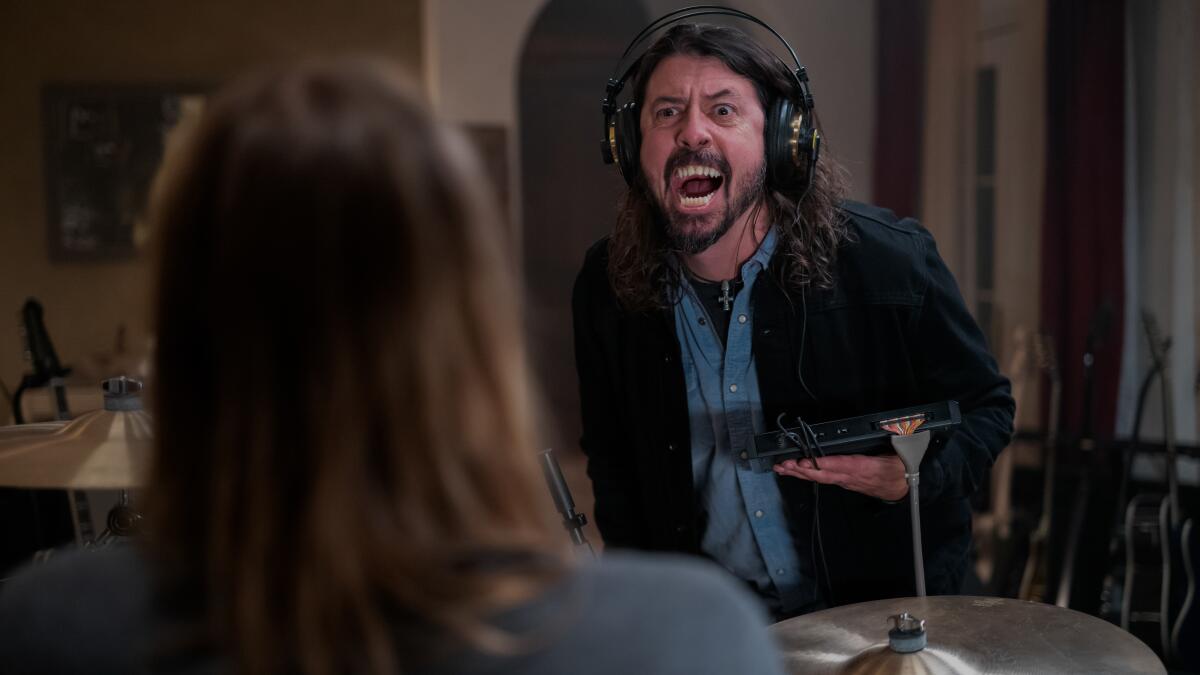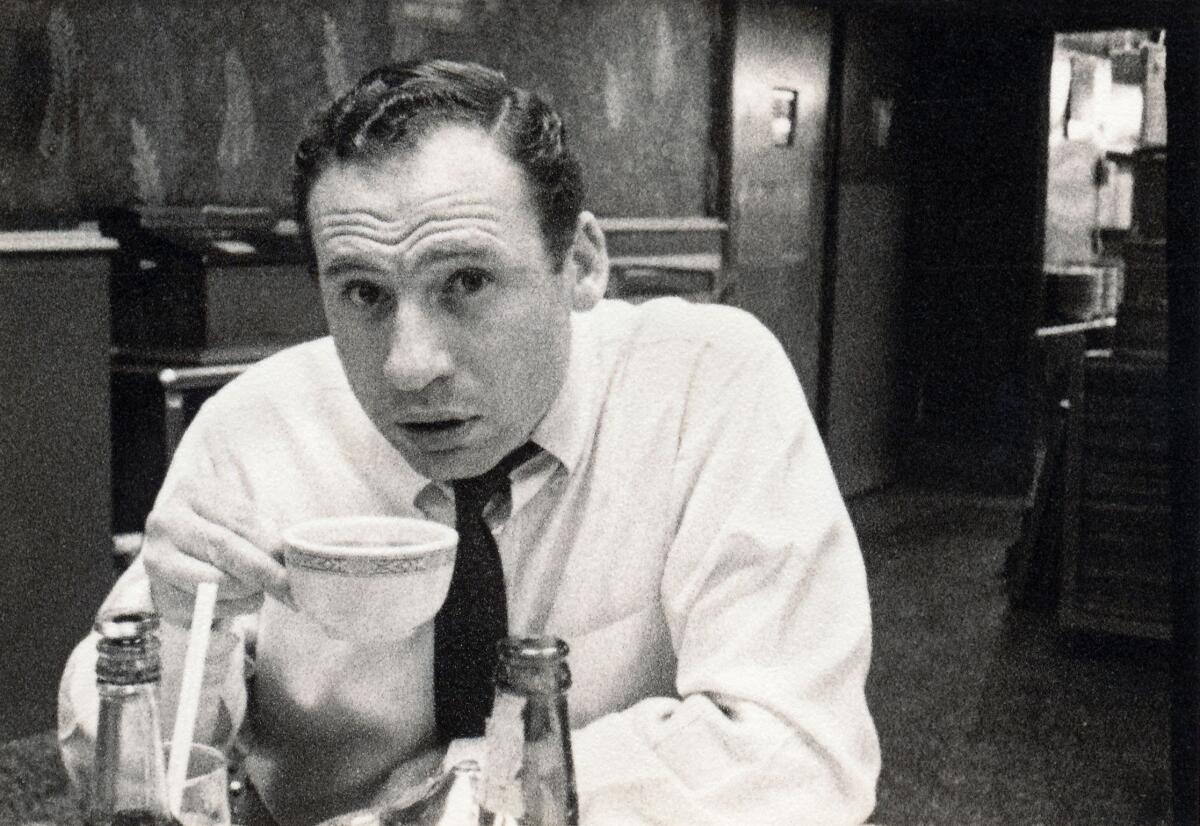Peter Dinklage sings as a soulful ‘Cyrano’
Hello! I’m Mark Olsen. Welcome to another edition of your regular field guide to a world of Only Good Movies.
Only good movies
Get the Indie Focus newsletter, Mark Olsen's weekly guide to the world of cinema.
You may occasionally receive promotional content from the Los Angeles Times.
Earlier this week, the motion picture academy announced a plan to present eight awards before the start of the Oscars ceremony telecast, then edit the acceptance speeches into the live broadcast. The response was fast and overwhelmingly negative from academy members and Oscars fans alike, with many concerned that vital categories showcasing the art and craft of moviemaking were being disrespected by the very organization meant to elevate and celebrate them.
Many of the craft categories being moved to a taped presentation during the show include nominees such as “Dune,” “No Time to Die” or “House of Gucci,” the kind of star-studded, popular fare many feel the Oscars overlook. As Josh Rottenberg wrote in surveying the responses: “As one set of observers gripe about the Oscars’ failure to include any blockbuster nominees or find ways to connect with more casual movie fans, others fight to preserve Oscar traditions. Now the academy has seemingly alienated both sides.”
Or as Glenn Whipp put it, “In chasing an audience that doesn’t care about the Oscars and wouldn’t watch the show if Iron Man resurrected himself from the dead and flew into the Dolby Theatre, the academy is alienating both its membership and the viewers who remain deeply invested in the Oscars and, yes, the art of filmmaking.”
Among the categories being relegated to this truncated presentation on TV are the three short-film categories. A program of the nominated shorts is in theaters. As Robert Abele wrote, “Every year it’s a given that Oscar fatigue from an aggressively hyped season can be wonderfully remedied by the pleasures of discovering the less-publicized — and usually more diverse — nominated shorts.”
The new screening series, “Mezzanine,” will host an ambitious two-night residency next week with French filmmaker Arnaud Desplechin, a key conveyor of contemporary anxieties and moral confusion in films such as “Kings and Queen” and “A Christmas Tale.” On Thursday, March 3, there will be a screening of a new digital restoration of Desplechin’s 1991 debut, “La vie des morts (The Life of the Dead).” The evening will include the U.S. premiere of “Petite conversation familiale (A Little Family Conversation),” a 2000 documentary directed by Hélène Lapiower, who had an acting role in Desplechin’s “My Sex Life.”
Then on Friday, March 4, there will be the U.S. premiere of Desplechin’s latest film, “Deception (Tromperie),” an adaptation of the 1990 novel by Philip Roth, starring Denis Podalydès and Léa Seydoux. Desplechin is scheduled to appear both nights.
This week on The Envelope podcast, I spoke to actress Aunjanue Ellis. She’s an Oscar nominee for her performance as Oracene Price, mother of Venus and Serena Williams, in Reinaldo Marcus Green’s “King Richard.”
Though it was Venus and Serena’s father, Richard Williams (played in the film by Will Smith), who often received the spotlight, Oracene was very involved in coaching and molding their girls into the tennis champions and cultural force they still are.
As Ellis said, “Honestly, you know, I feel every time someone is talking to me, every time I get a nomination or something like that, I feel like it’s Miss Oracene’s nomination. People are hearing her name in a way that they have not heard it before, and she deserves that. She’s been clapping for her daughters her entire life. I’m excited about the fact that somebody is clapping for her now. … I just felt that this was my shot to speak for Miss Oracene and to speak for those other women like her.”
Enjoying this newsletter? Consider subscribing to the Los Angeles Times
Your support helps us deliver the news that matters most. Become a subscriber.
‘Cyrano’
Directed by Joe Wright from a screenplay by Erica Schmidt, “Cyrano” is a musical retelling of the tale of Cyrano de Bergerac, shot in Sicily, with music by Bryce and Aaron Dessner of the band the National. Soldier Cyrano (Peter Dinklage) pines for Roxanne (Haley Bennett), but knowing she is not interested in him, he aids young Christian (Kelvin Harrison Jr.) in wooing her while she is also being pursued by a villainous duke (Ben Mendelsohn). The film is in theaters.
For The Times, Justin Chang called the film, “sweet, earnest and sometimes enchanting,” adding, “It’s not always the most graceful retelling of this oft-told tale, and its ardent defense of love for love’s sake can feel paper-thin one moment and swooningly sincere the next. What gives the movie its sustaining pulse is Dinklage. Singing may not be this actor’s obvious forte (his ’90s punk-band days aside), which might seem like a fatal setback for a character defined by his masterly self-expression. But even when Dinklage’s vocals wobble, his soulful baritone and melancholy delivery carry the day. His expressions alone bring out the deep, aching vulnerability in this Cyrano, whose anguished feelings for Roxanne register with almost palpable force. ‘’Cause every time I see you,’ he sings, ‘I am overcome’ — and so, in these moments, are we.”
For the New York Times, A.O. Scott wrote, “Wright, while a canny craftsman, is too committed to good taste to go over the top into either melodrama or camp. The music strikes a pretty good balance between rock ’n’ roll economy and show-tune extravagance, though the soundtrack is like an album of second-best songs. Only a plaintive anthem sung by soldiers on the eve of battle stands out, partly because its sentimentality has little to do with the central love triangle.”
For the Washington Post, Ann Hornaday wrote, “What ensues is one of the great tragedies of romantic literature, a heartbreaking exercise in classic irony that serves as a commentary on appearance and reality, façade and authenticity, and human beings’ enduring inability to get out of our own way. … ‘Cyrano,’ like the best art its implacable hero celebrates, is full of poetry, romance, terror and truth. It feels beamed from a distant past, but also sprung fully formed from 21st century anxieties. Wright has given Rostand and Schmidt’s twin visions his own signature: fleet, playful and unapologetically fanciful, but also tempered by surpassing sadness and loss. The result is equal parts heart-rending and haunting.”
For Rolling Stone, David Fear wrote, “In terms of being a late addition to what’s turned into a banner year for movie musicals, it falls somewhere in between Spielberg’s fabulous ‘West Side Story’ and Lin-Manuel Miranda’s fawning ‘Tick, Tick … Boom!’ This was the British filmmaker who gave the world ‘Anna Karenina’ as a ‘Moulin Rouge’-ish meta-spectacle and an austere staging of Ian McEwan’s ‘Atonement’ that breaks for a five-minute, single-shot siege at Dunkirk, after all, so Wright is clearly willing to take big swings at the risk of serious misses. … ‘Cyrano’ may sometimes feel like it’s struggling to find a way to say something new about a beloved, centuries-old work of art, one that’s been updated and deconstructed and reconstructed ad infinitum. Once the sex-symbol movie star starts whispering in its ear what to say, however, and how to act, and why it’s the well-spoken sadness of it all that makes it so swoon-worthy — those are the moments that make this musical positively sing.”

‘Studio 666’
Directed by BJ McDonnell from a screenplay by Jeff Buhler and Rebecca Hughes, from a story by Dave Grohl, “Studio 666” is a horror comedy starring Grohl and his band Foo Fighters. As the musicians struggle with recording a new album, Grohl becomes possessed by a demonic spirit haunting the mansion where they are living and working. Besides the band, the movie features appearances by Whitney Cummings, Will Forte, Jeff Garlin, Lionel Richie and Jenna Ortega and is in theaters.
For The Times, Katie Walsh wrote, “The whole thing feels as if it was a lark for Grohl, who gets the meatiest (literally) role, while the rest of the band feels held hostage, standing around delivering flat reaction lines to their lead singer. The jokes are stale, the energy is stilted, and the whole thing feels like a misbegotten vanity exercise cooked up in the pandemic to keep them occupied. It’s also about an hour and a half too long: Excise the corny dialogue and jumbled plot and cut together the kills, and ‘Studio 666’ would be a fun extended music video, which is what it should have been in the first place.”
For the New York Times, Wesley Morris wrote, “The movie exudes real ‘Scooby-Doo’-meets-‘The Shining’ vibes that rope in Korean horror and extend to Grohl, who gives, if not his all, then at least his most charismatic ‘some.’ He knows what to do with his eyes, when to narrow, roll and pop them. … In a film starring so many people who can’t act, a good set of eyes is an indication of effort, of life. And Grohl is expending something here, blurring the line between demonic possession and prima donna.”
For the AP, Jake Coyle wrote that the film “was conceived as a lark, and that’s exactly how it comes off. It’s a goof, and there’s something to be said for watching Grohl and the gang having so much fun. … It’s rare for any musical act to make a movie like this today — documentaries seem the preferred format these days — and rarer still for it to be a band that’s been around as long as the Foo Fighters have. But hopefully, it starts a new trend among ’90s acts. Maybe a hairbrained heist movie with Pavement or a science-fiction thriller with Radiohead?”

‘The Automat’
Directed by Lisa Hurwitz, “The Automat” is a documentary about the chain of restaurants owned by Horn and Hardart that became a piece of classic Americana for their coin-operated windows dispensing food. Among those reminiscing in the film are Mel Brooks (who also wrote and sang the film’s theme song), Ruth Bader Ginsburg, Colin Powell and Elliott Gould. The film is in limited release.
For The Times, Gary Goldstein wrote, “As compact and enticing as those windowed compartments that once dispensed tasty food for mere nickels, the documentary ‘The Automat’ takes an affectionate — and affecting — look at the famed Horn & Hardart restaurant chain and its singular place in dining history. Producer-director Lisa Hurwitz shot the film from 2013 to 2021. She incorporated a treasure trove of archival material mainly from the early to mid 20th century into an enjoyable retelling of how the automat found its way into America’s hearts, minds and stomachs.”
For Time, Stephanie Zacharek wrote, “Even if you’ve never had the pleasure of eating in an automat, Hurwitz brings the experience to life. She also traces the rise and fall of this mini-chain as an indication of the changing habits of diners, and ordinary citizens, across nearly the span of the 20th century. And, best of all, she gets Mel Brooks on camera, waxing poetic about his Brooklyn childhood and, specifically, his love for the automat. What more do you want from a documentary?”
For the New York Times, Wesley Morris wrote a piece so powerful and insightful it sort of flips the script and becomes the justification for the movie, as if the movie now exists for this review: “Hurwitz and her editors, Michael Levine and Russell Greene, have the interviews, archival footage and bright, soaring, relentless music to plunge us, accordingly, into states of delight and visceral lament. I, at least, am astounded that a movie this chipper, one so easily distracted by its boldface names (Hurwitz includes footage of Brooks essentially telling her how to make the movie), also feels like the key to some lock on the American soul. Just about every source says that what they loved about the automat was that everyone was welcome. So as the millionth exterior shot and umpteenth photo of those towering cabinets hit me, I got sad, too: why oh why did it all have to end? The answer is typical: the interstate, suburbanization, mismanagement, classism, snobbery, inflation. All of which this movie does more than allude to.”

Only good movies
Get the Indie Focus newsletter, Mark Olsen's weekly guide to the world of cinema.
You may occasionally receive promotional content from the Los Angeles Times.




